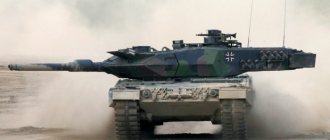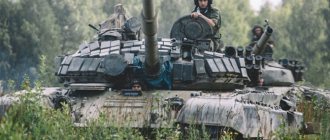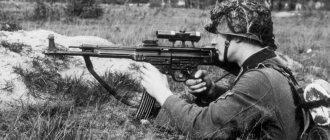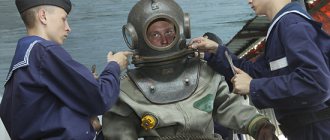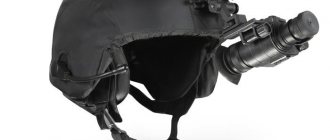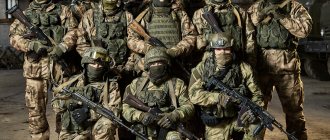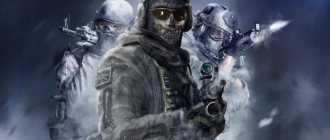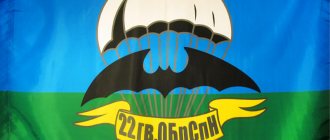In four months, the German army, the Bundeswehr, may no longer have special forces called Kommando Spezialkräfte (KSK): they are in danger of being disbanded. In this case, one company of German special forces will be disbanded immediately. In addition, this entire elite unit will stop participating in maneuvers and international missions, and the task of training its personnel will be assigned to another army unit. The German military counterintelligence (MAD) is also awaiting a serious audit with possible organizational conclusions.
The German Defense Minister reacted harshly
These are the consequences of the loud military-political scandal that broke out in Germany. What happened was exactly what the democratic public of Germany, which had well learned the lessons of German history, had always feared: the country’s armed forces fell, at least partially, under the influence of right-wing extremists and neo-Nazis. Hence the harsh reaction of German Defense Minister Annegret Kramp-Karrenbauer, who had already warned about the danger of right-wing radicalism in the Bundeswehr.
German Defense Minister Annegret Kramp-Karrenbauer
On June 29, she arrived at the KSK location and presented an ultimatum to the special forces personnel: either the military personnel remain part of the problem or become part of the solution. Specifically, this means that they received a probationary period until October 31 to prove the ability to “self-cleanse” their ranks. If this does not give the desired result, this unit will be completely disbanded.
On June 30, the Ministry of Defense informed the Bundestag in writing about the planned reform. It was developed on the basis of a 55-page report presented by Annegret Kramp-Karrenbauer by a working group created by her order on May 29. On July 1, the Minister of Defense came to a meeting of the parliamentary defense committee.
Bundeswehr - parliamentary army
The fact is that Germany has a parliamentary army; this distinguishes the Bundeswehr from presidential armies in many other countries, where the commander-in-chief, who gives orders for the use of troops, is the head of state. And in Germany, and this is due to the country’s historical experience, the use of armed forces outside the territory of the NATO bloc is possible only with the permission of parliament.
Soldiers of the German special forces KSK during an exercise in Germany
Accordingly, the Minister of Defense is obliged to coordinate many issues related to defense policy with deputies, who, in turn, have the right to demand detailed information about the state of affairs in the army.
On July 1, after a meeting with deputies, Annegret Kramp-Karrenbauer gave a press conference at which she explained what emergency measures would be taken regarding KSK and why they were necessary. At the same time, she emphasized that the overwhelming majority of the unit’s fighters are faithful to the constitutional order of Germany. At the same time, she noted that a kind of elitism arose in the special forces, isolation from other parts of the Bundeswehr, which contributed to the spread of radical sentiments.
Right-wing special forces soldiers with connections to MAD
The trigger for the current events was a search conducted by police in May in the East German state of Saxony on the land of a KSK soldier. A secret warehouse of weapons and ammunition was discovered there. It was after this that the Minister of Defense created a working group designed to thoroughly understand all the circumstances of this emergency. Moreover, alarming signals related to special forces personnel have been multiplying since April 2017.
KSK emblem on the beret of one of the servicemen
Then the soldiers of the 2nd KSK company gave a farewell to one of their commanders and during this party, according to some accounts, they listened to the music of right-wing radical rock bands, raised their hands in the Nazi salute (yawned) and had fun throwing severed pig heads at each other . It is this company that will now be unconditionally disbanded.
In January 2022, military counterintelligence MAD reported that 20 KSK soldiers were suspected of right-wing views. Compared to the total strength of the unit, this is five times more than the average in the Bundeswehr. Later, a shadow fell on MAD itself: reasonable suspicions arose that its employees informed special forces soldiers about the progress of the investigations.
And it became quite alarming after it became clear that the Bundeswehr currently cannot explain where a total of 85 thousand rounds of ammunition and 62 kilograms of explosives went from its arsenals. Therefore, now the troops will take an inventory of all property. It remains to be seen whether this is due to negligence or malice.
Special forces: why does Germany need them?
With all this, Annegret Kramp-Karrenbauer leaves no doubt that Germany needs special forces, and therefore the possible complete disbandment of a particular KSK unit does not at all mean a fundamental abandonment of this kind of highly professional units. They, the Minister of Defense recalls, are needed, in particular, for the release of German citizens held hostage in war zones.
Actually, it was for this purpose that the KSK special forces were created in 1996, and the DW media company played a key role in this. During the civil war in Rwanda, which in 1994 escalated into genocide of one of the local population groups, German citizens, employees of the Deutsche Welle radio station (Deutsche Welle), who worked in the city of Kigali at a relay station, were in mortal danger. At the request of the German government, they were taken out of this African country by Belgian paratroopers, since German units trained to perform such tasks simply did not exist at that time.
True, according to media reports, the KSK army special forces, created under the impression of these events, did not have to free the hostages - unlike the GSG-9 police special forces. However, special forces soldiers have repeatedly participated in operations in Afghanistan and in training local personnel, for example, in Jordan.
See also:
Farewell to Afghanistan: 13 years of ISAF mission
First military mission outside Europe
On January 11, 2002, the first 70 German troops arrived in Kabul. Thus began the first non-European combat operation of the Bundeswehr. At the height of the ISAF mission, up to 5,350 Bundeswehr personnel were based in Afghanistan. Germany contributed the third largest military contingent after the United States and Great Britain to the international ISAF force.
Farewell to Afghanistan: 13 years of ISAF mission
How did Brandenburg-800 come about?
During the hostilities of the First World War, Hauptmann Theodor von Hippel (a veteran of the colonial wars) noticed that military operations proceeded more successfully and with minimal losses when scouts penetrated behind enemy lines dressed in enemy military uniforms or simple civilian clothing.
Saboteurs behind enemy lines
On his initiative, in 1940, the eight hundredth special purpose regiment “Brandenburg” was created, or rather, several units were combined into one regiment. The training base was located near the Brandenburg region of Germany.
It is noteworthy that the Brandenburg-800 never took part in hostilities in its entirety. The special forces were used in squadrons or in small groups, which were assigned to various units of the ground forces.
Responsibility for northern Afghanistan
The Bundeswehr was deployed in a relatively calm region in the north of the country. Thus, it was possible to soften criticism in Germany itself and at the same time fulfill the expectations in the world associated with the participation of the Bundeswehr in the ISAF mission. Since October 2003, German soldiers have been based in Kunduz province. In 2006, Germany assumed primary responsibility for stability in northern Afghanistan.
Farewell to Afghanistan: 13 years of ISAF mission
Post-war years
Since the summer of 1944, the unit began to exist more as a simple army division, rather than an elite and assault one. This was largely facilitated by the arrest of Admiral Canaris due to his participation in the assassination attempt on Hitler. The regiment is attached to the Grossdeutschland division. Until May 1945, the remaining soldiers of the regiment fought in this brigade. The Brandenburg-800 was no longer a special special purpose unit.
After the end of the war, the regiment completely disintegrated, its fighters moved to other countries: Latin America, Egypt, China. The best saboteurs became highly paid military consultants, instructors, and mercenaries. The rank and file joined the ranks of military units.
The article was read by 14,224
Specific assistance to the population
Germany was the first NATO country to send specialists to the regional infrastructure reconstruction teams in Afghanistan (PRT). The restoration of civilian structures and armed security were understood as two sides of the same coin. Germany will provide financial assistance for the reconstruction of Afghanistan after 2014.
Farewell to Afghanistan: 13 years of ISAF mission
Black day
On September 4, 2009, German Colonel Georg Klein requested a NATO airstrike against two fuel tankers stolen by the Taliban in Kunduz province. As a result, more than 90 civilians, including children, were killed. The investigation in Germany into suspicion that Colonel Klein committed a war crime was closed.
Farewell to Afghanistan: 13 years of ISAF mission
Careless statements by the federal president
On May 22, 2010, German President Horst Köhler brought down a storm of criticism in Germany with a statement made on a plane on the way back from Afghanistan. He justified the participation of the Bundeswehr in the ISAF mission, including the economic interests of Germany. Shortly after this announcement, Köhler resigned.
Farewell to Afghanistan: 13 years of ISAF mission
Gradual withdrawal of troops
By the end of 2014, the Bundeswehr, in agreement with its NATO partners, will completely withdraw its troops from Afghanistan. Back in 2010, German soldiers left the province of Badakhshan, and a year later - the province of Kunduz. Bundeswehr military bases were transferred to the Afghan armed forces. The German base near the city of Mazar-i-Sharif was the main Bundeswehr field camp in northern Afghanistan until the end of 2012.
Farewell to Afghanistan: 13 years of ISAF mission
Combat operations in the USSR
In 1940-1942, Brandenburg-800 carried out sabotage work in the Soviet Union. During this time, about 15 operations were carried out, and only 3 of them were failures.
German saboteur
Here is a short diary of the combat operations of this unit:
- Ensuring a breakthrough for the 123rd Wehrmacht division. Saboteurs dressed in the uniform of German customs officers shot at the Soviet border cordon.
- Capture of the city of Przemysl by two companies of the 1st battalion.
- Capture of the railway bridge on the Lida-Molodechno highway. The saboteurs landed at night from a height of 50 meters and held the bridgehead for two days.
- Capture of two more bridges of this highway, not far from the Belarusian Bogdanovo station.
- Capture of bridges over the Berezina River.
- The capture of a bridge in the Dvinsk area, which allowed the combined group of Major Wolf to capture the city. The whole operation took 5 hours: at 07:00 the saboteurs destroyed the bridge guards, at 12:00 the Germans occupied Dvinsk.
- Capture of Lvov. Ukrainian nationalists from the Nachtigal battalion took part in the operation.
- The destruction of anti-aircraft searchlights at Cape Peklu, which ensured the redeployment of troops to the Taman Peninsula.
- Destruction of the divisional headquarters of the Red Army in the rear;
- Undermining of railway tracks on the Bologoe-Toropets and Bologoe-Staraya Russa lines. Note that this group was partially destroyed by NKVD units, but the operation was successful.
- Punitive operation against a partisan detachment near Dragobuzh.
- Capture of a bridge near Pyatigorsk.
The unit took part in the military operation to capture Maykop. This happened in 1942, and is considered the biggest success for the Brandenburg 800. 62 soldiers dressed in the uniform of NKVD officers and entered the city in captured cars. We found out the organization of the defense, neutralized the army telephone lines so that the command could not contact the leadership in a short time. The saboteurs spread a rumor that Maykop had already been surrounded by Wehrmacht troops, although the Germans were 20 kilometers from the city. Residents panicked when they heard this from an NKVD officer, Red Army soldiers began to leave their positions, and complete chaos began. It was at this moment that German troops easily captured the city.
However, Operation Bumblebee to seize oil-producing enterprises in Grozny and Baku failed. Lieutenant Lange's group was destroyed during the landing.
Brandenburg-800 saboteurs in Soviet uniform
Note that despite the careful planning of each Brandenburg-800 operation, saboteur attacks were often based on pure improvisation. The soldiers acted according to the situation, but managed to complete their assigned tasks.
The last stronghold is the Marmol military base
The Marmol base was the place where many Bundeswehr soldiers said goodbye to Afghanistan. From there, military personnel were sent back to Germany. Marmol will remain the largest Bundeswehr base in Afghanistan after 2014. At the end of the ISAF mission, about 650 German instructors will be stationed in this camp, who will train and advise the Afghan army.
Farewell to Afghanistan: 13 years of ISAF mission
Black Forest Special Forces
It just so happened historically that the special units of the German Bundeswehr may well lay claim to the title of the youngest special forces of the NATO armies. To be more precise, it is the history of the Second World War that is to blame for the fact that the thought of German army special forces frightened both denazified German politicians and Germany’s senior NATO partners for a very long time. The 800th Special Purpose Regiment “Brandenburg” left too bad memories of itself. At the same time, the “Brandenburgers” made their mark not only in the USSR (which during the Cold War it was customary to turn a blind eye to), but also in Africa. Nevertheless, over time, special forces appeared in Germany.
Tank hunters
The Germans were allowed to do something quite quickly. So, in July 1956, a decision was made to create airborne units in the Bundeswehr. As a result, Fallschirmjägerbrigade 25, among others, was born, renamed Luftlandebrigade 25 in 1971.
Taking into account the specifics of the military planning of the Bundeswehr, which throughout the Cold War was preparing to “lie with bones” under the tracks of the Soviet tank armadas, the 25th Airborne Brigade actually turned out to be an anti-tank unit. In its 251st and 252nd battalions of the combat companies, only the 2nd and 3rd were rifle companies, but the 4th and 5th bore the characteristic German tricky name Luftlandepanzerabwehrkompanie - “airborne anti-tank company.”
The landing self-propelled gun "Wiesel" leaves the CH-53G transport helicopter. The requirement to transport two such vehicles by CH-53 helicopters was one of the main ones in their design.
This, of course, did not mean that the other companies did not have anti-tank weapons, they were simply given lighter weapons, such as various Panzerfausts and the Milan man-portable ATGM. The anti-tank paratroopers had even more powerful and, accordingly, heavier Tou ATGMs. It was not very convenient to carry this equipment on your back, so the paratroopers first received Kraka ATVs (Kraka - Kraftkarren), and then a specialized landing self-propelled gun "Wiesel". Although in some photos the Wiesels (especially with crews) look like a funny toy, this car was welcomed by the Bundeswehr. The principle “it’s better to go badly than to go well” is not forgotten there.
On August 24, 1989, the 25th Airborne Brigade officially received the addition of “Black Forest” (German: “Black Forest”) to its name, based on its location of deployment. This was good news, but there was more. Perestroika was in full swing in the USSR, Secretary General Gorbachev was removing Soviet tanks from Europe, and in the new conditions, anti-tank landings turned out to be not very necessary.
From anti-tank to commando
Of course, in such a large and rather inert structure as the army, you cannot simply take and transform one specialized unit into another, completely changing its profile. The Bundeswehr command did not intend to start a revolution, but the 5th “heavy” companies in three airborne brigades (25th “Black Forest”, 26th “Saarland”, 27th “Lippstadt”) began to rebuild into commando companies. Their tasks were formulated as follows:
- actions behind enemy lines for targets of operational significance: command posts, communication centers, etc.;
- actions against bridges and other communications;
- conducting reconnaissance;
- destruction of air defense systems and weapons of mass destruction systems.
After the first training, which took place jointly with British and American special forces units, as well as with the “native” GSG-9, it was decided to expand the functions of future German commandos to include anti-terrorism tasks. The list also added the evacuation and removal of German citizens from dangerous regions, the release of hostages and the fight against terrorism. However, so far these were more dreams than plans for real use. In the early 90s, German politicians still reacted quite painfully to the idea of using German soldiers outside the country, especially in combat operations.
KSK soldiers training to storm a building
Nevertheless, some soldiers of the special forces companies already visited Somalia in 1993, providing security for the German humanitarian mission. Unlike the Americans, Bundeswehr soldiers in Somalia acted strictly within the framework of the UN Security Council decision and peacekeeping mandate. Moreover, they had the right to shoot to kill only to repel attacks. Moreover, even such activities prompted a request from the opposition to the Federal Constitutional Court, which indicated that such an operation requires mandatory approval of the Bundestag.
There would be no happiness...
In April 1994, the civil war that was blazing in African Rwanda unexpectedly backfired in Germany. Nine employees of the television and radio (Deutsche Welle) and four members of their families were blocked at a relay station in the Rwandan capital Kigali. The special forces companies were put on alert, but the German leadership hesitated, both for purely political reasons and fearing that the Bundeswehr or GSG9 would not be able to carry out the rescue operation at the proper level. As a result, before the cumbersome federal traffic light gave the green light, commandos broke through to the rescue of the Germans, but they were... Belgian paratroopers.
A KSK fighter with his service dog participates in joint tactical parachute exercises with the Americans in Arizona
It seems that everything ended well. But, on the one hand, such a situation was considered not very prestigious for Germany, which could not independently help out its own citizens, on the other hand, it was clear that next time the Belgians or anyone else might not be around.
Already in July of the following year, Chancellor Helmut Kohl decided to create a new special unit within the Bundeswehr, which received the simple name Kommando Spezialkräfte, or KSK for short. At the same time, the initial list of tasks for the future special forces was noticeably expanded. In addition to “rescuing and evacuating German citizens in special situations abroad,” they added “obtaining important information in crisis zones,” “protecting VIPs,” and finally “carrying out combat missions on enemy territory.”
In September 1996, the 25th Airborne Brigade "Black Forest" was disbanded and its place was taken by the future KSK. Most of the personnel were recruited from those same commando companies, as they had already received part of the necessary training. In addition to them, the KSK included fighters from several more very interesting units of the Bundeswehr: the deep reconnaissance company Fernspähkompanie 100 and Fernspähkompanie 300, also disbanded in 1996 as part of the restructuring of the Bundeswehr.
KSK soldiers on patrol in Afghanistan
The first instructors for KSK, of course, were fellow countrymen from GSG-9. This was followed by contacts (more precisely, the development and deepening of existing contacts) with the British from the SAS, the Israeli Sayeret Matkal and training at the homeland of American special forces - the John F. Kennedy training center at Fort Bragg.
While the KSK soldiers and commanders were acquiring the necessary skills, there was debate in the Bundestag whether Germany needed army special forces, and if “yes,” then in what form? Representatives of left-wing parties argued that for incidents like what happened in Rwanda, the existing GSG-9 is quite sufficient. Their opponents countered that police special forces were designed for a completely different type of operation—working against small groups of terrorists who had captured a specific target—rather than operating in hostile territory. In addition, the deliberate unconstitutionality of the KSK became a serious problem: convening a meeting of the Bundestag to approve each foreign mission would be simply unrealistic, not even to mention the violation of secrecy.
Nevertheless, the differences were overcome, or at least quieted down for a while, and KSK received its “start in life.”
Where does a German get his Afghan sadness?
Participation in Operation Enduring Freedom in 2001 was the first serious combat test for German special forces. However, judging by the available information, KSK’s first pancake came out, if not lumpy, then certainly a little damp. At first, the command of the NATO special forces did not really trust the Germans, preferring to assign veterans from the USA, England or France to responsible and complex tasks.
But the scope of the operations kept growing, and there was no longer any need to go over it - the Germans found work both during the clearing of the Taliban cave fortified area of Tora Bora, and during the ill-memorated Operation Anaconda. True, following the results of participation in Anaconda, the Allies reproached the Germans for being too soft. In particular, when a German observation post was discovered by an Afghan shepherd, the Germans rolled up and left the position, rather than quietly burying the problem under a nearby bush and continuing with the mission.
A group of KSK fighters on a march in the desert
Apparently, the KSK took these remarks to heart, because in subsequent years the German special forces became the center of several scandals in their homeland. One of them was the investigation into the case of Murat Kurnaz, a Turk who was born in Bremen and had a German residence permit. In 2001, he was arrested in Pakistan and transported to Kandahar, and from there to a prison at the Guantanamo Bay base, where he was kept until 2007, although neither the American nor German intelligence services found any evidence of his involvement in terrorist activities. According to Kurnaz, in addition to the Americans, soldiers with stripes in the form of the German flag also took part in his interrogations. After his release, he identified several KSK fighters from photographs, but the investigation into this fact was eventually discontinued.
The protagonist of another scandal was the former KSK commander Reinhard Günzel. For a German officer, extreme right-wing views, in general, are not a hindrance to service, but only as long as he does not express them publicly. Gunzel decided to play politics a little and immediately found himself in retirement, even without the standard letter of gratitude “for faithful service.” The parallels drawn by the former brigadier general between the current KSK and the Brandenburg regiment mentioned at the beginning of the article, and even more so comparisons with the SS troops, did not arouse enthusiastic feelings in the German Ministry of Defense. They reasonably decided that traditions are good, but it is still better not to touch some details of the past.
Hauptfeldwebel Danil Wirth became the first KSK soldier to die in Afghanistan
Although 20 years have passed since the creation of Kommando Spezialkräfte, this unit cannot yet boast of a rich history. It is unlikely that it is just a matter of secrecy, which traditionally hides a significant part of the work of special forces. If KSK had truly high-profile successes on its record, such as the liberation of an embassy with hostages or the storming of the presidential palace, they would somehow find a way to trumpet this to the whole world. True, the German special forces have not yet had deafening failures like the American “Eagle Claw”. What will happen next - time will tell.
Literature:
- https://www.deutschesheer.de
- https://www.spiegel.de
- https://www.faz.net
